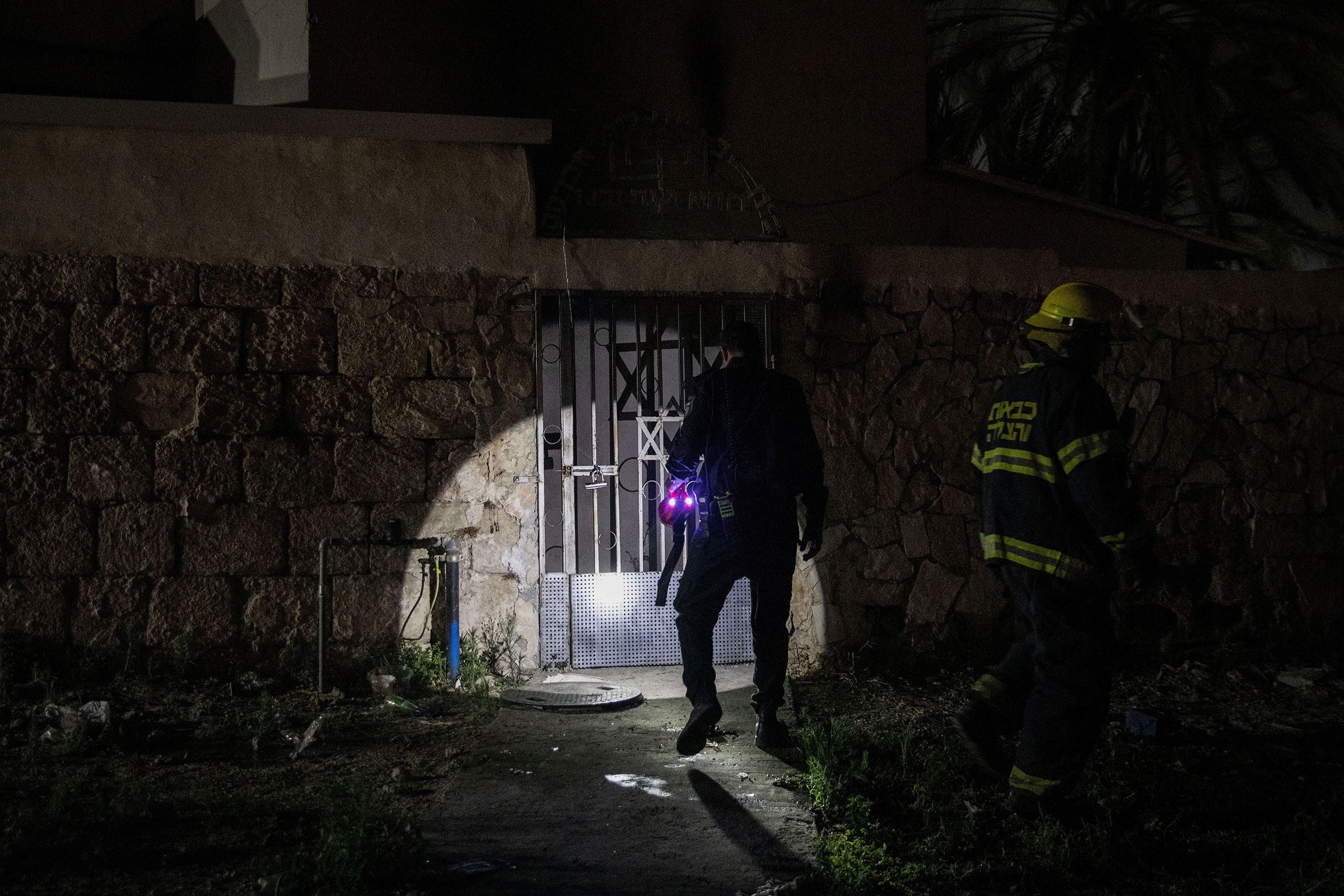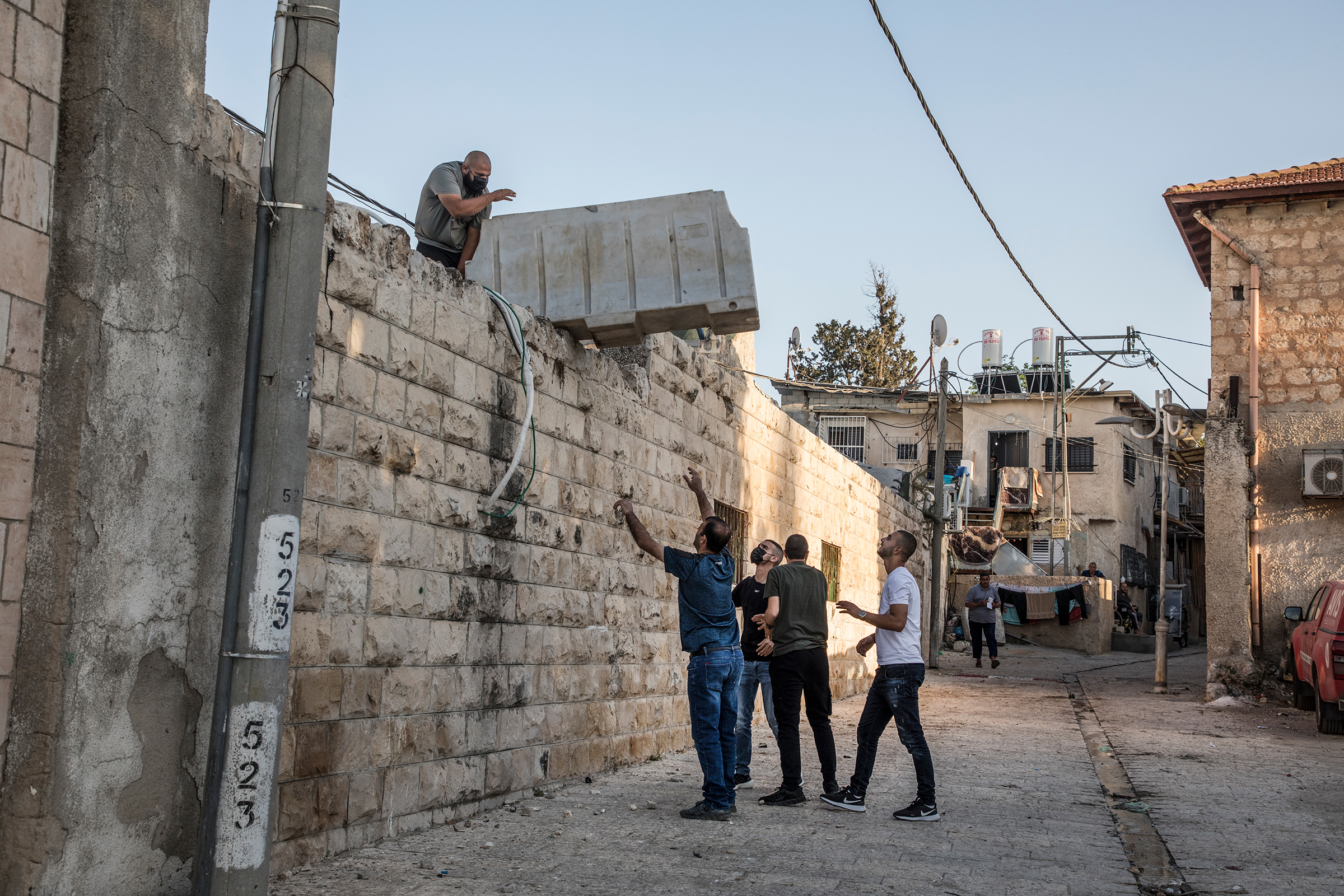
It’s the Sabbath, and dozens of Jewish young men are strolling through a mostly Arab neighborhood wearing yarmulkes and white shirts, M-16s slung over their shoulders or pistols in their waistbands. They move as if this were a settlement in an Arab city in the Israeli-occupied Palestinian territories and they were the locals, even the landlords.
But the young men aren’t locals, and this only feels like the West Bank. It’s Lod, a mixed Arab-Jewish city around 15 miles from Tel Aviv, and the new front in the Israeli-Palestinian conflict. The two peoples have contested the land between the Mediterranean Sea and the river Jordan for a century. And on maps, each has its own area. But the reality on the ground is the 300 armed men afoot in Lod. They are Jewish settlers who rushed from the West Bank, interrupting their assertion of dominion on land in nominally Palestinian territory to reinforce Jewish residents of Lod intent on “settling” an Arab neighborhood within Israel proper.
“It’s not a militia,” insists Ari Elon, a tall, husky 24-year-old from Cleveland who immigrated to Israel, served in the Israeli army and lives in the West Bank settlement of Alon Shvut. Like the others here, Elon answered a call to his settlement’s WhatsApp group for armed men to go to Lod to protect the homes of scared members of an ideological Jewish nationalist religious community called Lod Garin Torani (Lod Torah Seed). The city had been in turmoil after Arab youths began rioting a few days earlier.
The volunteers gather in what they call the War Room, located in the midst of the mostly Arab neighborhood of Ramat Eshkol, where a growing number of Garin families now live, welcome or not. Their reinforcements from the West Bank, all with military experience, pore over maps of the neighborhoods and take calls from foot patrols and Jewish residents. “Is there a car burning near the mosque?” Ronen Algavish asks after one call. “I’m certain no Jews set any cars on fire today,” says a young man named Yoni. A whiteboard lists neighborhoods and the number of armed volunteers each has posted to it. The floor is strewn with helmets and armored vests.
In terms of deaths, damage and international attention, the events in Lod were overshadowed by what unfolded in the Gaza Strip a week later. The militant group Hamas fired rockets from its coastal enclave into Israel, killing at least a dozen people. The Israeli air force responded with airstrikes that left at least 248 dead. For the international community, it was the focal point for an urgent round of diplomacy to deliver the cease-fire that halted the conflict on May 21.
But for Israel, a war with Gaza is containable and finite. What Jewish and Arab Israelis heard exploding in their neighborhoods was something new. In Acre, and in other mixed cities where Arabs and Jews live side by side, neighbors turned on each other. Now Israelis fear the crumbling of a coexistence that for seven decades has allowed the country’s Jewish majority to live in peace beside the 20% of the population who, if their homes were in the West Bank or Gaza, would be called Palestinian. Many actually prefer that to “Israeli Arab,” which implies a compatibility that, in any event, is no long assumed. And nowhere is the deterioration more visible, and potentially more combustible, than in Lod.

‘After 70 years, there’s no faith in the state’
On May 10, Israeli police stormed al-Aqsa Mosque in East Jerusalem, two days after blocking Israeli Arabs from visiting the Mosque for a special Ramadan prayer. As the news filtered out, Muslims in Lod planned a protest in front of the city’s al-Omari Mosque, known as the Great Mosque. Musti, a 24-year-old Arab who feared giving his full name, says he was there that night.
“The police gave us permission. We walked out orderly with just some signs that said, ‘Leave Sheikh Jarrah’ and ‘Don’t destroy Al-Aqsa’ and we shouted ‘Allahu Akbar’ (God is Great). The police were waiting for us with helmets and weapons.” After one hoisted a Palestinian flag, the police started shooting stun grenades at protesters, and the crowd responded with stones and burning tires.
“From this point on, there was no control,” says Sheikh Yusuf Albaz, the imam of the Great Mosque. Youths set dumpsters on fire and threw rocks. But the situation escalated sharply with the killing of Moussa Hassouneh, 32, a young Arab father of three, that night by members of the Garin, whom the Arabs call “settlers.” The Jewish men said they opened fire when Arabs threw stones at them. Hassouneh’s father Malek said his son was not even involved.
“Sure, the Arabs threw stones,” says Sheikh Albaz, a big man with a brown beard whose Hebrew is almost like his mother-tongue. “After everything that happened, they threw stones. But the stones are not the point. The point is that the youth don’t believe in the country anymore. After 70 years, there’s no faith in the state.”
The police arrived and dispersed the crowd without arresting any Garin members. Hours later they arrested four Jews, all of whom said they acted in self-defense. Israel’s Minister of Public Security called for their release, and they went home two days later. Hassouneh’s father, Malek, wants his sons killers to go to jail. Yoel Frankenburg, 34, a member of the Garin, said he thinks they should get the Israel Prize, the highest cultural honor in the country. “They saved our lives,” he said.
When Hassouneh was buried the next day, police shot stun grenades at the funeral procession and clashes broke out. Youth set a police car on fire and threw Molotov cocktails inside synagogues, burning rooms. Yigal Yehoshua, 52, a Jewish father of two, was injured when Arabs pelted his car with stones and died a week later. Elsewhere across the country, Arab riots were answered by anti-Arab Jewish extremists, including “volunteers” from settlement outposts. On WhatsApp, more than 100 groups formed to organize attacks on Arabs. One message told volunteers to bring “flags, bats, knives, guns, brass knuckles, wooden boards, pepper spray, anything that would hurt them. We will restore the honor of the Jewish people.”
Violence begot violence between mobs of Jews and Arabs in a spree of vandalism, stabbings and beatings in Lod, Acre, Haifa and elsewhere. Prime Minister Benjamin Netanyahu, who for years has suggested that Israeli Arabs are a fifth column, now urged reconciliation. “Our goal is, first, to halt the violence,” he said. “Afterwards, to rehabilitate the relations between Jews and Arabs. We live together in this state, and we need to get back on the track of coexistence, cooperation and partnership in the great success called ‘the State of Israel.’”

No choice but to live together
The tensions within Lod have existed since the then-Arab city called Lydda fell to Jewish forces in the 1948 war that founded Israel. Most of the city’s Arab population was expelled, and Jews moved in. When the city fell on hard times in the 1980s, Arabs moved into housing tenements vacated by Jews. Then, about 20 years ago, the Garin members began buying apartments in those neighborhoods too. They describe it as a project of upkeep. “The goal was to attract young religious couples to help the economic situation of the city,” says Frankenburg.
Others see a different agenda. “They want to Judaize the area, show sovereignty and push the Arabs, the Arab culture and the Arab language out of Lod,” says Amnon Be’eri-Sulitzeanu, co–executive director of the Abraham Initiatives, a nongovernmental organization in Lod that works to advance coexistence between Jews and Arabs.
The Arabs of Lod, who make up about 30% of the city’s residents, say Mayor Yair Revivo has prioritized services and facilities for nationalist religious Jews in Arab neighborhoods. “The mayor only takes care of the Jews,” said Musti, the protester. “He doesn’t care about the Arabs. He’s happy if we just kill each other.”
Their biggest grievance is over housing. Revivo, a former campaign manager for Netanyahu, has intensified demolitions of old Arab buildings, prevented Arabs from buying new homes, and also from buying the government homes they live in, all while building new neighborhoods exclusively for the religious Jews.
He has also suggested that the Arabs of Lod pose a strategic threat, and in December sparked an uproar by saying, “Violence is part of the Arab culture,” and promising to deport families of criminals.
In a statement, the Lod municipality said that during Revivo’s seven years in office, $100 million have been spent to improve the lives of the Arab sector, that he works to strengthen the co-existence in the city and that all claims otherwise are lies and incitement.
But Arabs point to the reality of their lives in Israel: they are just over 20% of the population and about half of the poorest municipalities. Netanyahu’s government passed a law in 2018 that removed Arabic as an official language and gave Jews an “exclusive right to national self-determination.” In 2019, the Prime Minister wrote on Instagram that “Israel is the nation-state of the Jewish people—and only it.” “What we see in Lod is what we see in Israel,” says Be’eri-Sulitzeanu, “but much more extreme because the disparities are greater and the municipality’s support for the [Garin] is much more.”
If peaceful coexistence in Lod was an illusion before, it is shattered now. Sporadic attacks on Arabs and Jews continued in late May. The Jewish paramilitary operated its War Room with 10 armed volunteers on a rapid-response team and 20 more stationed on rooftop lookouts around Ramat Eshkol. At the centuries-old Great Mosque, Muslims slept inside at night to protect it. “We will return to living together because there is no choice,” says Sheikh Albaz, the imam.
Across town, Esther Ochigava, a secular Jewish resident, went to visit her Arab neighbor when he came home injured after being beaten by Jews. “I apologized to him,” she says. But the situation has changed: “At traffic lights, I never looked at who’s in the car next to me, but now I do.”
With reporting by Leslie Dickstein/New York
More Must-Reads from TIME
- Cybersecurity Experts Are Sounding the Alarm on DOGE
- Meet the 2025 Women of the Year
- The Harsh Truth About Disability Inclusion
- Why Do More Young Adults Have Cancer?
- Colman Domingo Leads With Radical Love
- How to Get Better at Doing Things Alone
- Michelle Zauner Stares Down the Darkness
Contact us at letters@time.com